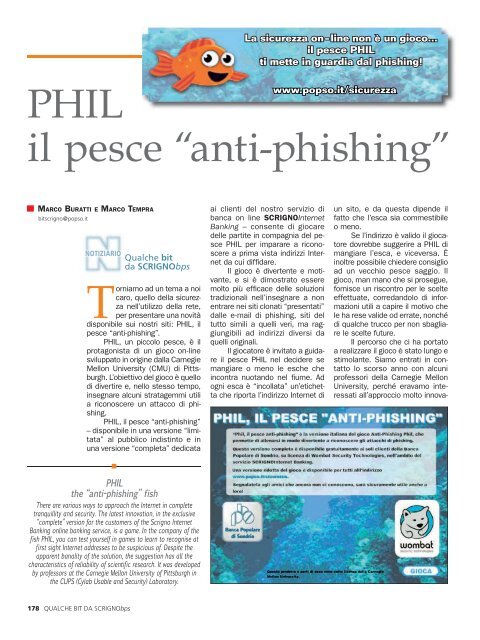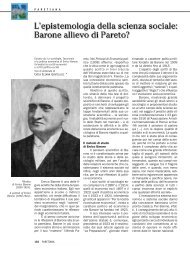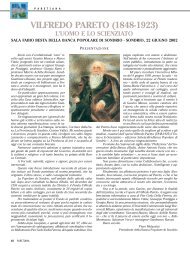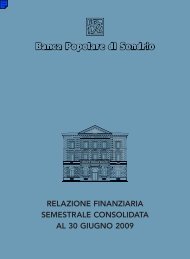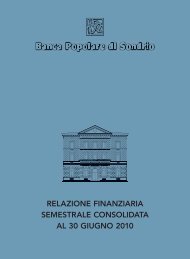PHIL il pesce “anti-phishing” - Banca Popolare di Sondrio
PHIL il pesce “anti-phishing” - Banca Popolare di Sondrio
PHIL il pesce “anti-phishing” - Banca Popolare di Sondrio
You also want an ePaper? Increase the reach of your titles
YUMPU automatically turns print PDFs into web optimized ePapers that Google loves.
<strong>PHIL</strong><br />
<strong>il</strong> <strong>pesce</strong> <strong>“anti</strong>-<strong>phishing”</strong><br />
MARCO BURATTI E MARCO TEMPRA<br />
bitscrigno@popso.it<br />
178 QUALCHE BIT DA SCRIGNObps<br />
NOTIZIARIO Qualche bit<br />
da SCRIGNObps<br />
Torniamo ad un tema a noi<br />
caro, quello della sicurezza<br />
nell’ut<strong>il</strong>izzo della rete,<br />
per presentare una novità<br />
<strong>di</strong>sponib<strong>il</strong>e sui nostri siti: <strong>PHIL</strong>, <strong>il</strong><br />
<strong>pesce</strong> <strong>“anti</strong>-<strong>phishing”</strong>.<br />
<strong>PHIL</strong>, un piccolo <strong>pesce</strong>, è <strong>il</strong><br />
protagonista <strong>di</strong> un gioco on-line<br />
sv<strong>il</strong>uppato in origine dalla Carnegie<br />
Mellon University (CMU) <strong>di</strong> Pittsburgh.<br />
L’obiettivo del gioco è quello<br />
<strong>di</strong> <strong>di</strong>vertire e, nello stesso tempo,<br />
insegnare alcuni stratagemmi ut<strong>il</strong>i<br />
a riconoscere un attacco <strong>di</strong> phishing.<br />
<strong>PHIL</strong>, <strong>il</strong> <strong>pesce</strong> <strong>“anti</strong>-<strong>phishing”</strong><br />
– <strong>di</strong>sponib<strong>il</strong>e in una versione “limitata”<br />
al pubblico in<strong>di</strong>stinto e in<br />
una versione “completa” de<strong>di</strong>cata<br />
<strong>PHIL</strong><br />
the <strong>“anti</strong>-<strong>phishing”</strong> fish<br />
There are various ways to approach the Internet in complete<br />
tranqu<strong>il</strong>lity and security. The latest innovation, in the exclusive<br />
“complete” version for the customers of the Scrigno Internet<br />
Banking online banking service, is a game. In the company of the<br />
fish <strong>PHIL</strong>, you can test yourself in games to learn to recognise at<br />
first sight Internet addresses to be suspicious of. Despite the<br />
apparent banality of the solution, the suggestion has all the<br />
characteristics of reliab<strong>il</strong>ity of scientific research. It was developed<br />
by professors at the Carnegie Mellon University of Pittsburgh in<br />
the CUPS (Cylab Usable and Security) Laboratory.<br />
ai clienti del nostro servizio <strong>di</strong><br />
banca on line SCRIGNOInternet<br />
Banking – consente <strong>di</strong> giocare<br />
delle partite in compagnia del <strong>pesce</strong><br />
<strong>PHIL</strong> per imparare a riconoscere<br />
a prima vista in<strong>di</strong>rizzi Internet<br />
da cui <strong>di</strong>ffi dare.<br />
Il gioco è <strong>di</strong>vertente e motivante,<br />
e si è <strong>di</strong>mostrato essere<br />
molto più effi cace delle soluzioni<br />
tra<strong>di</strong>zionali nell’insegnare a non<br />
entrare nei siti clonati “presentati”<br />
dalle e-ma<strong>il</strong> <strong>di</strong> phishing, siti del<br />
tutto sim<strong>il</strong>i a quelli veri, ma raggiungib<strong>il</strong>i<br />
ad in<strong>di</strong>rizzi <strong>di</strong>versi da<br />
quelli originali.<br />
Il giocatore è invitato a guidare<br />
<strong>il</strong> <strong>pesce</strong> <strong>PHIL</strong> nel decidere se<br />
mangiare o meno le esche che<br />
incontra nuotando nel fi ume. Ad<br />
ogni esca è “incollata” un’etichetta<br />
che riporta l’in<strong>di</strong>rizzo Internet <strong>di</strong><br />
un sito, e da questa <strong>di</strong>pende <strong>il</strong><br />
fatto che l’esca sia commestib<strong>il</strong>e<br />
o meno.<br />
Se l’in<strong>di</strong>rizzo è valido <strong>il</strong> giocatore<br />
dovrebbe suggerire a <strong>PHIL</strong> <strong>di</strong><br />
mangiare l’esca, e viceversa. È<br />
inoltre possib<strong>il</strong>e chiedere consiglio<br />
ad un vecchio <strong>pesce</strong> saggio. Il<br />
gioco, man mano che si prosegue,<br />
fornisce un riscontro per le scelte<br />
effettuate, corredandolo <strong>di</strong> informazioni<br />
ut<strong>il</strong>i a capire <strong>il</strong> motivo che<br />
le ha rese valide od errate, nonché<br />
<strong>di</strong> qualche trucco per non sbagliare<br />
le scelte future.<br />
Il percorso che ci ha portato<br />
a realizzare <strong>il</strong> gioco è stato lungo e<br />
stimolante. Siamo entrati in contatto<br />
lo scorso anno con alcuni<br />
professori della Carnegie Mellon<br />
University, perché eravamo interessati<br />
all’approccio molto innova-
tivo <strong>di</strong> alcune soluzioni “non convenzionali”<br />
sv<strong>il</strong>uppate nel loro laboratorio,<br />
<strong>il</strong> CUPS (CyLab Usable<br />
Privacy and Security Laboratory).<br />
Questo laboratorio è speciale per<br />
<strong>il</strong> fatto che esso concentra lavori<br />
<strong>di</strong> ricerca che mirano a rendere<br />
semplici e fruib<strong>il</strong>i da parte dei meno<br />
esperti le soluzioni e i sistemi<br />
per la sicurezza e per la protezione<br />
della privacy. I ricercatori impiegano<br />
una combinazione <strong>di</strong> tre strategie<br />
per rendere i sistemi <strong>di</strong> sicurezza<br />
più accessib<strong>il</strong>i: costruire sistemi<br />
che funzionano senza che sia necessario<br />
un intervento umano;<br />
rendere i sistemi intuitivi; insegnare<br />
agli ut<strong>il</strong>izzatori (che chiamano<br />
humans, intendendo con questo<br />
termine le persone che interagiscono<br />
con i sistemi) a svolgere in<br />
sicurezza le attività critiche.<br />
Si tratta <strong>di</strong> uno dei più grossi<br />
progetti <strong>di</strong> ricerca statunitensi riguardanti<br />
<strong>il</strong> fenomeno del phishing<br />
e la sua prevenzione.<br />
Dopo aver approfon<strong>di</strong>to la<br />
conoscenza con questi ricercatori,<br />
abbiamo proposto <strong>di</strong> costruire<br />
qualcosa insieme. La cosa si è<br />
resa semplice per <strong>il</strong> fatto che alcune<br />
delle soluzioni realizzate<br />
nell’ambito <strong>di</strong> ricerca possono poi<br />
essere trasformate in prodotti <strong>di</strong><br />
mercato, grazie al lavoro svolto<br />
da una società, la Wombat Security<br />
Technologies, fondata da alcuni<br />
professori proprio per commercializzarli<br />
e far sì che i risulta-<br />
ti ottenuti possano <strong>di</strong>ffondersi<br />
anche all’esterno del mondo accademico.<br />
Abbiamo quin<strong>di</strong> deciso <strong>di</strong><br />
collaborare su un progetto per la<br />
realizzazione della versione italiana<br />
del gioco <strong>PHIL</strong>, <strong>il</strong> <strong>pesce</strong> <strong>“anti</strong><strong>phishing”</strong>,<br />
e da quel momento<br />
Wombat Security Technologies e<br />
gli esperti <strong>di</strong> <strong>Banca</strong> <strong>Popolare</strong> <strong>di</strong><br />
<strong>Sondrio</strong> hanno lavorato fi anco a<br />
fi anco.<br />
La decisione <strong>di</strong> collaborare<br />
è probab<strong>il</strong>mente scaturita da una<br />
curiosa sintonia riguardo ad alcu-<br />
ne linee <strong>di</strong> intervento: da sempre<br />
BPS considera importante la<br />
frui b<strong>il</strong>ità e “usab<strong>il</strong>ità” dei servizi<br />
on-line;<br />
– la tematica della sicurezza è<br />
seguita costantemente dal nostro<br />
team, in ottemperanza all’impegno<br />
preso con la certificazione ISO<br />
27001;<br />
– l’approccio alla sicurezza anche<br />
tramite la formazione e l’informazione<br />
agli utenti del servizio<br />
(citiamo ad esempio l’iniziativa<br />
navigosereno.it, da noi descritta<br />
sul numero 103 del Notiziario) è un<br />
punto <strong>di</strong> attenzione della banca.<br />
Un articolo che parla <strong>di</strong> <strong>PHIL</strong>,<br />
<strong>il</strong> <strong>pesce</strong> <strong>“anti</strong>-<strong>phishing”</strong>, a fi rma<br />
della professoressa Lorrie Faith<br />
Cranor, con la quale abbiamo avuto<br />
modo <strong>di</strong> lavorare nella defi nizione<br />
della nostra soluzione, è stato<br />
pubblicato nel numero <strong>di</strong> <strong>di</strong>cembre<br />
2008 dello Scientifi c American.<br />
Siamo orgogliosi <strong>di</strong> questa nostra<br />
nuova realizzazione e La invitiamo<br />
a provarla e suggerirla ai Suoi<br />
amici, perché è interesse <strong>di</strong> ognuno<br />
aumentare la conoscenza riguardo<br />
alla sicurezza on-line, tanto più se<br />
lo si può fare <strong>di</strong>vertendosi.<br />
Può scoprire <strong>PHIL</strong>, <strong>il</strong> <strong>pesce</strong><br />
<strong>“anti</strong>-<strong>phishing”</strong> e le altre iniziative<br />
sulla sicurezza <strong>di</strong> <strong>Banca</strong> <strong>Popolare</strong><br />
<strong>di</strong> <strong>Sondrio</strong> collegandosi all’in<strong>di</strong>rizzo<br />
http://www.popso.it/sicurezza.<br />
QUALCHE BIT DA SCRIGNObps 179


